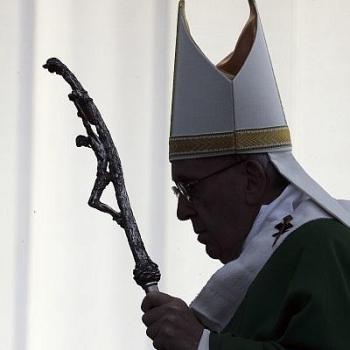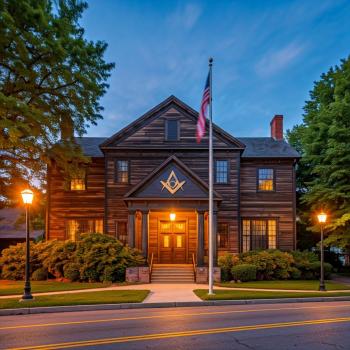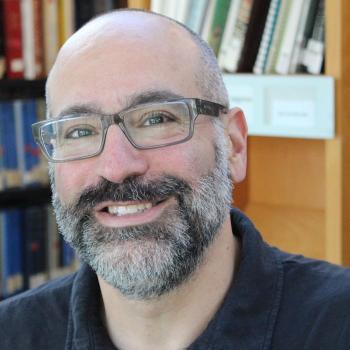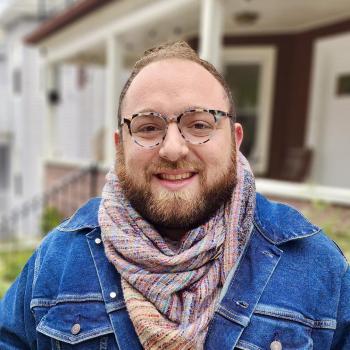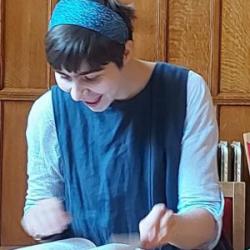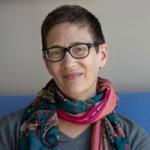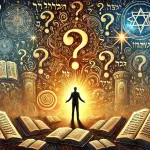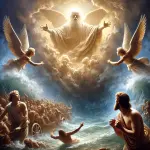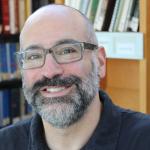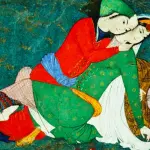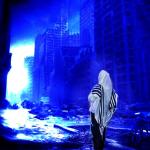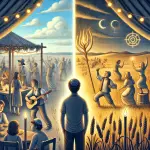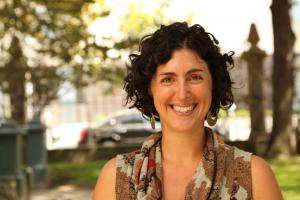 Parashat Chukat (Numbers 19:1-22:1)
Parashat Chukat (Numbers 19:1-22:1)
By Rabbi Adina Allen
We encounter the Israelites in the midst of their 40 years of wandering in the desert, in a moment of intense difficulty. They are tired. They’re scared. They rail against Moses and Aaron, demanding, yet again, what they remember as the comforts of Egypt, “Why have you taken us out of Egypt to bring us to this evil place; it is not a place for seeds, or for fig trees, grapevines, or pomegranate trees, and there is no water to drink?!” (Numbers 19:5). In the midst of the wilderness, back-breaking labor and task masters’ harsh punishment becomes rosy in their memory as the Israelites stare out at the expanse before them. Slavery is deemed preferable to the overwhelm and uncertainty of this makom rah, this evil place of wilderness. Why?
Wilderness has long been a theme I have loved to teach on. In other years, the idea of wilderness has been a provocative idea; a compelling image for that place of ambiguity and unknown in which we may, at some point in our lives, find ourselves. This year, there is no escaping the reality of wilderness right here, right now. Here we are, in the midst of a global pandemic that has upended life as we’ve known it, in the midst of a national uprising against systemic racism and police violence. In perhaps no other time in recent memory has the metaphor of wilderness been so intensely resonant. I understand the desire of the Israelites to get out of this place more viscerally than I ever have before.
When I picture “wilderness” two different images come to mind. One is that of a dark, dense forest. Trees climbing, vines hanging, strange sounds and unfamiliar animals, birds and insects all around me. Every time I take a turn towards what I think might be a clearing up ahead, I find myself even deeper in the woods, entangled in the thickness of my surroundings. The other image is that of a vast open desert, much like the terrain through which the Israelites were wandering. This wilderness is hot, dry, and almost silent save for the sounds of wind blowing across the sand. Here, I scan in every direction for a way out, and everywhere I look the landscape seems to stretch on forever. In both images, wilderness is vast and all-encompassing, resisting all of my attempts to navigate through to the other side. Both images evoke in me a feeling of being overwhelmed, disoriented, and experiencing a lack of control, and of fear and fascination with what I might find there.
Both of these images of wilderness speak to me of where we are right now. The pandemic has cleared away what were the routines and structures of our lives leaving us in a landscape barren and empty. Storefronts are closed, schools are empty, the sounds of children playing together in the park or people singing together in worship have fallen silent. We keep trying to see to the other side, searching for a promise of reopening, of when this all will pass, yet this wilderness seems to stretch out as far as the eye can see. There is no end in sight. And the national uprising and reckoning around racism and police brutality is rocking the consciousness of white folks across the country. Increasingly, those of us who are white are going out into the streets and into ourselves to begin to understand and undo the tangled web of White Supremacy that has wound its way through every aspect of who we are and how we experience the world. Each time we think we’ve found a way out or the hint of a clearing up ahead, we continue on only to find that just beyond is another swath of forest, thicker and deeper than the one before. Our wilderness is not a pristine natural landscape. It is the enormity and the overwhelming feelig of seeing where everything is falling apart; the cracks that reveal the lunacy of the edifices we’ve allowed to be built. In this wilderness we are both Pharaoh and the slaves.
In his article “Becoming Midbar,” Rabbi Steven Kushner writes that there are only three places in Torah: Mitzrayim or Egypt, which means “the narrow place”; eretz zavat chalav u’ d’vash, “land that flows with milk and honey”, and midbar, the unknown empty space of wilderness. Wilderness is the huge expanse between the narrow straits that have confined us and the world that we dream of. It is where the majority of Torah takes place, and the majority of our lives, too.
The Israelites complain of the wilderness saying that it is rah, bad, because it is not a place for seeds, and there are no trees or vines. It is true, the wilderness is not a place where we put down roots and plan to stay. It is a place we travel through and within, circling around and around, like the Israelites, unable to exit until we’ve learned what we needed to learn, undone what we needed to undo. The wilderness we are in won’t let us go until we’ve learned every inch of its terrain.
Towards the end of our Parsha, we are given a list of the places the Israelites journeyed during this time in the wilderness, “The Israelites marched on and camped at Ovot; they marched on from Ovot and camped at Iyyei Ha-avarim, in the wilderness that faces Moav…And from the wilderness—[to] Matanah” (Num.21:10-18). Targum Onekelos, the 2nd century translation of the Torah into Aramaic, gives us a deeper read of this verse. Rather than reading Matanah as the name of a place to which the Israelites traveled, the Targum translates matanah according to the meaning of this Hebrew word. Here the verse is read instead as “and from wilderness, a gift.”
Rather than trying to avoid it, escape it, or hurry through it, we have to be in this place of wilderness and accept it for what it is — both restriction and gift. Time in the wilderness is one that calls us to new growth and discovery, difficult though it may be. It is a time of sloughing off past frameworks and identities and allowing a new ethos to emerge. It is a time of collective consciousness shifting and priorities realigning. It is a time in which the possibility of Divine connection becomes more tangible as it becomes more necessary to guide us through as we sit in the midst of this great unknown.
The wilderness in which we find ourselves now will not let us go for some time. May we give ourselves over to the intensity of its landscape. In so doing, may we discover the vital, life-giving gifts waiting to be found.
Rabbi Adina Allen is Co-founder and Creative Director of Jewish Studio Project where she works to activate the inherent creativity in individuals and communities to make life more meaningful, Judaism more vibrant and the world more just. Adina was ordained by Hebrew College in 2014 and is a recipient of the 2018 Pomegranate Prize for Jewish Education.




